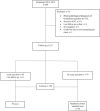Impact of CD 28, CD86, CTLA-4 and PD-1 genes polymorphisms on acute renal allograft rejection and graft survival among Egyptian recipients
- PMID: 38267522
- PMCID: PMC10808544
- DOI: 10.1038/s41598-024-52195-0
Impact of CD 28, CD86, CTLA-4 and PD-1 genes polymorphisms on acute renal allograft rejection and graft survival among Egyptian recipients
Abstract
To study the impact of four gene polymorphisms on acute renal allograft rejection (AR) and graft survival among Egyptian population. These 4 gene polymorphisms include: (1) CD 28 (rs3116496), (2) CD86 (rs1129055), (3) CTLA-4 (rs3087243), (4) PD-1 (rs2227982). This is a non-concurrent cohort study including 50 kidney transplant recipients diagnosed histopathologically as (AR) [study group] and another 50 matched allograft recipients without AR [control group]. Blood samples were taken from both groups and subjected to genotyping for the selected four genetic polymorphisms by TaqMan genotyping assay. The difference in genotypic distribution of CD 28: rs3116496 and CD86: rs1129055 wasn't statistically significant between the study and control groups (P = 0.22 and 0.33 respectively) and also both polymorphisms had no effect on graft survival (P = 0.36 and 0.74 respectively) while the addition of C allele to IVS3 +17T/C polymorphism in CD28 gene showed a protective effect against AR (P = 0.03). CTLA-4: rs3087243 AG genotype showed a protective effect against AR as it was more frequent in no rejection group compared to those with AR (P = 0.001) with a statistically significant impact on graft survival (P < 0.001), while PD-1: rs2227982 AG genotype was equally distributed between both groups (variant of unknown significance). There was no detected association between CD86 polymorphism: rs1129055 and CD 28 polymorphism: rs3116496 with the development of AR. However, C allele of CD 28 IVS3 +17T/C polymorphism and CTLA-4 polymorphism: rs3087243AG genotype both demonstrated a protective effect against AR.
© 2024. The Author(s).
Conflict of interest statement
The authors declare no competing interests.
Figures
Similar articles
-
Association between co-stimulatory molecule gene polymorphism and acute rejection of allograft.Transpl Immunol. 2014 Aug;31(2):81-6. doi: 10.1016/j.trim.2014.06.003. Epub 2014 Jun 18. Transpl Immunol. 2014. PMID: 24952299
-
Association of Polymorphisms in T-Cell Activation Costimulatory/Inhibitory Signal Genes With Allograft Kidney Rejection Risk.Front Immunol. 2021 Jun 2;12:650979. doi: 10.3389/fimmu.2021.650979. eCollection 2021. Front Immunol. 2021. PMID: 34149691 Free PMC article.
-
Association of CTLA-4 gene polymorphism with end-stage renal disease and renal allograft outcome.J Interferon Cytokine Res. 2014 Mar;34(3):148-61. doi: 10.1089/jir.2013.0069. Epub 2013 Dec 7. J Interferon Cytokine Res. 2014. PMID: 24313821
-
Human leukocyte antigen-G-14-base-pair-insertion/deletion polymorphism and graft survival in kidney transplant recipients.Exp Clin Transplant. 2014 Apr;12(2):89-94. Exp Clin Transplant. 2014. PMID: 24702138 Review.
-
[The influence of selected cytokine gene polymorphisms on the occurrence of acute and chronic rejection and on kidney graft survival].Postepy Hig Med Dosw (Online). 2009 Dec 14;63:613-26. Postepy Hig Med Dosw (Online). 2009. PMID: 20097948 Review. Polish.
Cited by
-
The Goat Cytotoxic T Lymphocyte-Associated Antigen-4 Gene: mRNA Expression and Association Analysis of Insertion/Deletion Variants with the Risk of Brucellosis.Int J Mol Sci. 2024 Oct 11;25(20):10948. doi: 10.3390/ijms252010948. Int J Mol Sci. 2024. PMID: 39456732 Free PMC article.
References
MeSH terms
Substances
Grants and funding
LinkOut - more resources
Full Text Sources
Medical
Research Materials



